Opening Words
Message from the UNCAC Coalition Chair
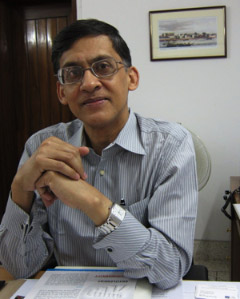
25 October 2015, by Manzoor Hasan
In November 2015 we will meet in St. Petersburg for the 6th UNCAC Conference of States Parties (COSP). This is a timely opportunity to celebrate the UNCAC’s many achievements since 2003. In particular, the UNCAC Review Mechanism has succeeded beyond expectations, with an encouragingly high level of state and civil society collaboration in the country reviews.
Continue reading →
Interview with Dimitri Vlassis, Secretary of the UNCAC COSP, UNODC
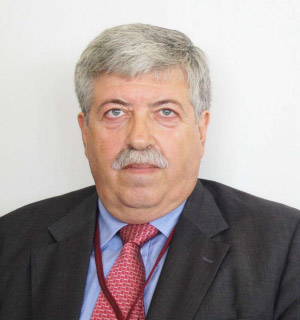
In its short history, the COSP has built the infrastructure for the full and effective implementation of the Convention. At its third session, it established the Implementation Review Mechanism (Resolution 3/1). At its fourth session it instituted the briefings for NGOs during the Implementation Review Group meetings (Resolution 4/6).
Continue reading →
Advocacy Focus
UNCAC Review Transparency Pledge
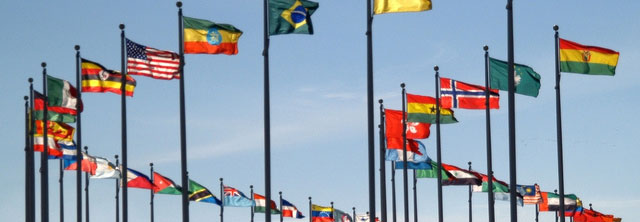
The UNCAC Coalition calls on UNCAC States Parties to pledge support for transparency and public consultation in addressing corruption.
The United Nations Convention against Corruption (UNCAC) is at a critical turning point. While the UNCAC has contributed to significant progress in the last decade, changed the political discourse on corruption, and proved itself an important global instrument, corruption continues to be a serious problem that affects every country.
Continue reading →
Civil society seeks stronger anti-corruption commitments from the countries gathered at the 6th UNCAC COSP

28 October 2015, by Gillian Dell
What’s on the civil society agenda at the 6th UNCAC Conference of States Parties (COSP)? And what will be the UNCAC Coalition’s focus in St Petersburg?
Although we expect fewer civil society participants in St Petersburg compared to previous COSPs, we still plan a high level of engagement, as evidenced by the number of civil society written submissions and side-events. Continue reading →
In search of remedies for victims of grand corruption

25 October 2015, by Kolawole Olaniyan
Corruption, especially grand corruption, is anathema to the effective enjoyment of human rights, but it is often considered an ‘ordinary and victim-less crime’. It isn’t.
Yet, the myth that corruption is a victimless crime has prevailed for many years; in part because of the narrowed conception of corruption, and the perceived legal and practical challenges to identifying victims such as causation, legal standing, and evidence-gathering. Continue reading →
6th COSP in St. Petersburg: We must make progress on asset recovery

21 October 2015, by Maud Perdriel-Vaissiere
The last Conference of States Parties to the UN Convention against Corruption (UNCAC) in Panama adopted a resolution on asset recovery (Resolution 5/3). It included concrete measures aimed to enhance the implementation of Chapter V and ultimately to make further progress on asset recovery. Continue reading →
UNCAC Coalition calls for States Parties to move on beneficial ownership transparency at 6th COSP

25 October 2015, by Christine Clough
When the States Parties to the UN Convention against Corruption (UNCAC) and official observers gather in St Petersburg next week for the 6th Conference of States Parties (COSP), the UNCAC Coalition will be advocating for enhanced language on beneficial ownership to strengthen corruption prevention and asset recovery. Continue reading →
Repairing the damage caused by corruption
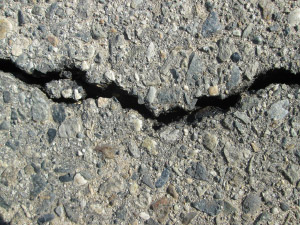
27 October 2015, by Dr Juanita Olaya
After years of working in the field of governance and anti-corruption I am convinced that fighting corruption should not be a goal in itself, and is of little help if it doesn’t translate into better services or better life conditions for citizens – in other words, it should benefit the public good. Continue reading →
Immunities from prosecution: Let’s burst the bubble

19 October 2015, by Tilman Hoppe
A few months ago, US$1 billion (!) went missing in Moldova. Various key suspects tried to shield themselves from prosecution through immunity as public officials. They are one of many examples of how corrupt public officials all over the world abuse immunities.
Continue reading →
Special Focus
Civil society participation: An essential element in anti-corruption efforts

21 October 2015, by Vanja Škorić
The fight against corruption is a long-term process, requiring deep structural changes to a country’s institutions, its legal framework and its culture. Therefore, actors outside government – especially in civil society – are an essential component to anti-corruption success. Continue reading →
Civil society participation in the UNCAC review mechanism
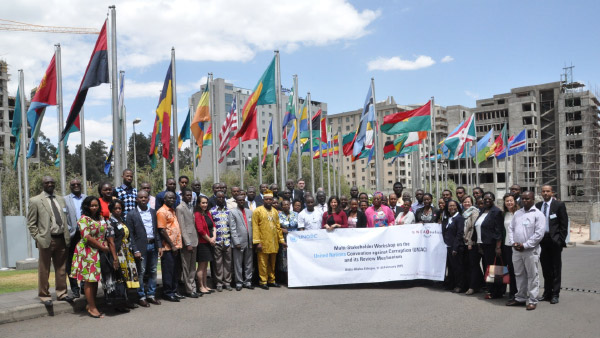
20 October 2015, by Mirella Dummar Frahi
Following the adoption of the UNCAC Review Mechanism in 2010, it became immediately apparent that government representatives would require training to support its implementation. Continue reading →
Special Topics
Promoting integrity and transparency in public procurement

22 October 2015, by Katja Bechtel and Susan Cote-Freeman
It is estimated that some US$9.5 trillion of public money is spent each year by governments procuring goods and services on behalf of their citizens. With such vast sums of money at stake, few government activities create greater temptation or opportunity for corruption. Indeed, the OECD estimates that 20 to 25 per cent of national procurement budgets is lost to corruption. Continue reading →
Corruption in an era of climate change: Stakeholders to discuss at high level UN anti-corruption meeting

1 October 2015, by Lisa Ann Elges and Juliet S. Sorensen
As global leaders settle on new directions for sustainable development and climate change avoidance, they are also faced with a number of corruption hurdles, which could create road-blocks to progress and effectiveness. Continue reading →
Practicing open data: Publishing court decisions in Germany

28 September 2015, by Angela Reitmaier
In order to hold government to account, people need to know what it is doing. That is why it is so important for civil society to be able to have access to information on all types of government actions. Advocating for what we call “open data” is at the heart of the anti-corruption movement. Continue reading →
Rich and poor: Different dynamics, different problems for the UNCAC

2 October 2015, by Adam Graycar
As the UNCAC review process is expected in the next year or two to start to focus on preventive measures (Chapter 2 of the UNCAC), it is more important than ever to emphasise that corruption takes different forms in different contexts. Continue reading →
Interviews
Interview with Madame Le Thi Thuy, Vietnam Government Deputy Inspector General
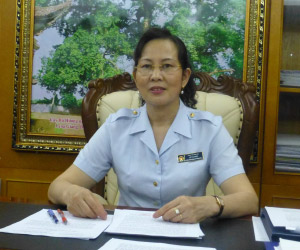
Does Vietnam already have plans for follow-up on the recommendations from the first cycle of the UNCAC review process?
The Government of Vietnam enacted Resolution No. 82/NQ-CP on 6 December 2012 with a view to implementing the recommendations from the first cycle of the UNCAC Review Process. Also, those recommendations have been taken into account when developing plans to revise some significant laws in Vietnam, such as the Penal Code, the Criminal Procedure Code and the Law on Anti-corruption. Continue reading →
Interview with Mr. Abdesselam Aboudrar, Chair, Central Authority for Corruption Prevention, Kingdom of Morocco
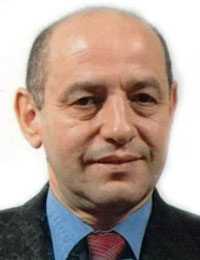
What is the current situation in Morocco regarding anti-corruption efforts?
The citizens are more and more demanding. As a result of our efforts, the government is about to adopt an anti-corruption strategy. It’s been a 20-year fight by civil society and our own institution.
What has also been achieved is the adoption of some laws and regulations. For example, the asset declaration law; the law on the protection of victims and experts; new regulations on public procurement; and reform of the judiciary were introduced in the last 4-6 years. Now this legal framework has to be implemented and enforced and reviewed. Some things don’t work in practice. Continue reading →
Coalition updates
New UNCAC review reports
Since August 2015, the following UNCAC review reports have been released:
- Executive summaries: Algeria, Brazil, Canada, Macedonia, Malta, Mexico, Singapore, Kazakhstan, Kenya, Liberia
- Full country reports: Kenya
Official country reports are available on both the UNODC website and on the UNCAC Coalition website.
New CSO reports
TI Turkey and TI Russia have both produced 2015 UNCAC parallel reports on their countries.
Civil society reports can be viewed on the UNCAC Coalition website.
New Anti-Corruption Resources and Events
Exporting Corruption Report 2015
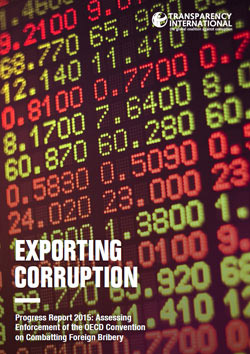
The OECD Anti-Bribery Convention, adopted in 1997, requires each signatory country to make foreign bribery a crime for which individuals and enterprises are responsible. The Convention is a key instrument for curbing the export of corruption globally because the 41 signatory countries are responsible for approximately two-thirds of world exports and almost 90 per cent of total foreign direct investment outflows. Transparency International’s annual progress report presents an independent assessment on the status of enforcement in all of the Parties to the Convention. Read the 11th annual OECD progress report.
Integrity of Public Officials in EU Countries: International Norms and Standards
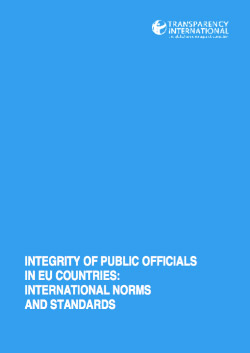
The OECD Anti-Bribery Convention, adopted in 1997, requires each signatory country to make foreign bribery a crime for which individuals and enterprises are responsible. The Convention is a key instrument for curbing the export of corruption globally because the 41 signatory countries are responsible for approximately two-thirds of world exports and almost 90 per cent of total foreign direct investment outflows. Transparency International’s annual progress report presents an independent assessment on the status of enforcement in all of the Parties to the Convention. This research paper looks at the international anti-corruption and good governance standards, focusing on the anti-corruption norms and defining the work of public officials. The analysis is divided into three main sections: prevention, criminalisation and citizens’ rights. It looks at the standards, overlaps and loopholes in each of the selected sub-fields, providing an insight into the most important aspects of monitoring of integrity standards in the public sector. Download the full report.
16th IACC Declaration: Zero Tolerance for Impunity

Nearly 1,200 people from 130 countries gathered in Putrajaya, Malaysia to discuss one of the world’s biggest challenges: how impunity enables the spread of corruption. Delegates came together to find the most effective strategies to stop impunity and hold to account those who benefit from the abuse of power, secret deals and bribery. Read the Putrajaya Declaration from 16th IACC 2015.
Gold Rush: Investment Visas and Corrupt Capital Flows into the UK
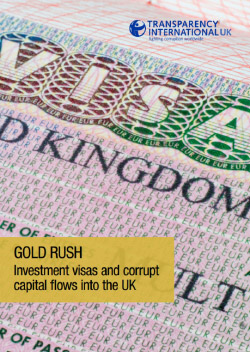
In this report “Gold rush: Investment visas and corrupt capital flows into the UK” Transparency International UK highlights how the UK’s Tier 1 Investor scheme can be vulnerable as a tool to launder the proceeds of corruption from around the world. Laundering the proceeds of grand corruption is not unique to the UK, nor is the UK alone in hosting a ‘golden visa’ scheme. A number of other major global financial and real estate investment centres are also both vulnerable and attractive to the corrupt. However, the UK is well-placed to lead international efforts to recover the proceeds of grand corruption. Read the full report online.
Lobbying in Europe
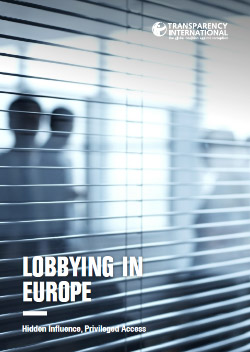
Our report is the first-ever comprehensive assessment of lobbying across Europe, looking at the quality of responses by both governments and EU institutions to the risks and realities of undue influence in public decision-making.
The report ranks 19 countries and three EU institutions in terms of their overall performance in safeguarding against undue influence and in promoting open and ethical lobbying. It also ranks their performance in three critical and inter-related areas of effective lobbying regulation. Read the Lobbying in Europe report.
Calendar
Important upcoming dates for UNCAC and other international anti-corruption meetings
| 30 October–1 November 2015 | The 8th Annual Conference and The General Meeting of the IAACA, St. Petersburg, Russia |
| 2–6 November 2015 | Sixth session of the Conference of the States Parties to the United Nations Convention against Corruption, St Petersburg, Russia |
| 2–3 November 2015 | 4th session of the Open-ended Intergovernmental Expert Meeting on International Cooperation, St Petersburg, Russia |
| 3–4 November 2015 | Resumed 6th session of the Implementation Review Group, St. Petersburg, Russia |
| 9 December 2015 | International Anti-Corruption Day |
Member in the Spotlight
Transparency International Russia, Center for Anti-Corruption Research and Initiatives

Transparency International Russia (TI Russia) is an autonomous non-profit and non-partisan organisation. It was founded in December 1999 as part of a global coalition against corruption. It aims at increasing awareness of corruption and promoting anti-corruption activities in Russia, through fieldwork, anti-corruption research and assessment of laws as well as providing legal assistance to citizens. Continue reading →
This UNCAC Coalition Newsletter was produced by Gillian Dell and Anastasia Sudzilovskaya of the Transparency International Secretariat Conventions Unit, which acts as secretariat to the UNCAC Coalition. It was produced with the assistance of consultants Rebecca Dobson (text editor) and Kai Chan (web developer).
The UNCAC Coalition Newsletter is funded by the Sigrid Rausing Trust.



